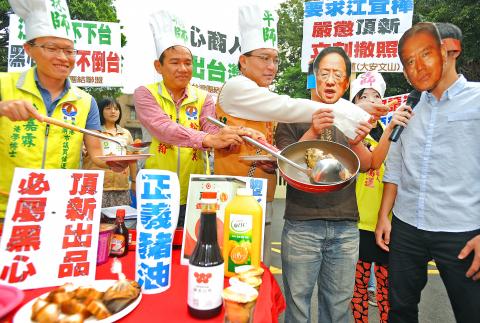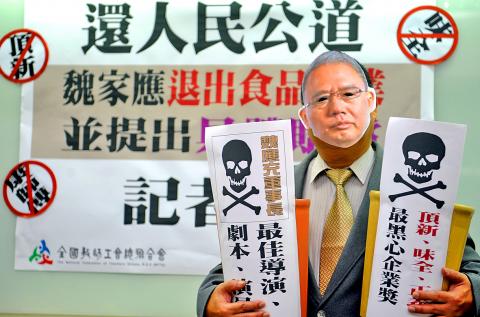Amid the snowballing oil scandal centering on the Ting Hsin International Group (頂新集團) food manufacturing giant, the Ministry of Finance yesterday announced that it would stop any attempts by the group to increase its stock holdings in banks and Taipei 101.
Vice Minister of Finance Wu Tang-chieh (吳當傑) said the ministry has expressed to Cathay Financial Holdings (國泰金控) and CTBC Financial Holding Co (中信金控) its determination that Ting Hsin would not obtain management over the skyscraper and that both financial groups have agreed to follow the ministry’s stance.
The board managing Taipei 101 is to be elected next year and Ting Hsin reportedly hoped to become the largest shareholder and thus, manager. Currently, Ting Hsin holds the second-largest share of the building’s stock, after the government’s 44 percent. Cathay Financial and CTBC Financial hold 7.73 percent and 6.12 percent respectively.

Photo: Chu Pei-hsiung, Taipei Times
“We had not thought that Ting Hsin and its subsidiaries could have betrayed consumers to this level,” Chinese Nationalist Party (KMT) Legislator Alex Fai (費鴻泰) yesterday said, referring to the widening cooking oil scandal.
On the Wei (魏) family’s — Ting Hsin Group’s founders — investment in Taipei 101, Fai said he would be keeping a close eye on the group so it is not allowed to manage the building.
As for the group’s other investments and attempts to buy out banks and China Network Systems Co (CNS, 中嘉網路), Fai said that financial groups should be wary that Ting Hsin would tunnel its money from the banks.

Photo: Chang Jui-chen, Taipei Times
That said, Fai asked banks to reconsider loans to the Wei family over the family’s purchase of units within Taipei’s The Palace (帝寶) luxury apartment complex, saying that the family may attempt to transfer ownership to other accounts and hide their assets.
Meanwhile, as more local governments and consumer groups echoed the call to boycott products from Ting Hsin and its subsidiaries, a number of public and private universities, including National Taiwan University, National Chengchi University, National Taiwan Normal University and Soochow University, also joined the boycott.
Other universities, such as National Chiao Tung University, National Cheng Kung University (NCKU) and Ming Chuan University said they complied with Ministry of Education’s announcement by offloading products that have been identified by the Ministry of Health and Welfare as problematic.

Photo: Chang Chia-ming, Taipei Times
According to NCKU secretary-general Chen Chin-cheng (陳進成), having a general boycott of Ting Hsin and its subsidiary companies’ products was “a little too passionate” a response, adding that laws should be amended so the government can better protect the public’s interests.
Elsewhere, all products from Wei Chuan Foods Corp (味全食品工業), also a subsidiary of Ting Hsin, went off the shelves of Taipei’s schools, related cooperatives and social organizations.
“This restriction will remain in place until related agencies have cleared up all concerns,” Taipei City Department of Education spokesman Chen Shun-ho (陳順和) said.
The company’s juice and milk products are to be most affected by the city’s decision, as the firm had provided more than 18,000 bottles of milk to the school system each week — 15 percent of the school system’s supply, he said.
As the city provides free milk once a week to all elementary-school students, he said some schools would be unable to provide milk to students this week and the city is working to obtain new suppliers by next week.
Separately, National Federation of Teachers’ Unions president Chang Hsu-cheng (張旭政) said that Ting Hsin should exit domestic markets entirely.
“The company has betrayed Taiwanese people’s trust in it by selling adulterated products,” Chang said, adding: “The Wei family should donate more than NT$10 billion [US$328.87 million] to the establishment of a food security foundation fund.”
The union added that today it would submit an appeal to the Control Yuan for an investigation of the Ministry of Health and Welfare to determine whether it has neglected its duty.
Additional reporting by Abraham Gerber

Right-wing political scientist Laura Fernandez on Sunday won Costa Rica’s presidential election by a landslide, after promising to crack down on rising violence linked to the cocaine trade. Fernandez’s nearest rival, economist Alvaro Ramos, conceded defeat as results showed the ruling party far exceeding the threshold of 40 percent needed to avoid a runoff. With 94 percent of polling stations counted, the political heir of outgoing Costa Rican President Rodrigo Chaves had captured 48.3 percent of the vote compared with Ramos’ 33.4 percent, the Supreme Electoral Tribunal said. As soon as the first results were announced, members of Fernandez’s Sovereign People’s Party

MORE RESPONSIBILITY: Draftees would be expected to fight alongside professional soldiers, likely requiring the transformation of some training brigades into combat units The armed forces are to start incorporating new conscripts into combined arms brigades this year to enhance combat readiness, the Executive Yuan’s latest policy report said. The new policy would affect Taiwanese men entering the military for their compulsory service, which was extended to one year under reforms by then-president Tsai Ing-wen (蔡英文) in 2022. The conscripts would be trained to operate machine guns, uncrewed aerial vehicles, anti-tank guided missile launchers and Stinger air defense systems, the report said, adding that the basic training would be lengthened to eight weeks. After basic training, conscripts would be sorted into infantry battalions that would take

GROWING AMBITIONS: The scale and tempo of the operations show that the Strait has become the core theater for China to expand its security interests, the report said Chinese military aircraft incursions around Taiwan have surged nearly 15-fold over the past five years, according to a report released yesterday by the Democratic Progressive Party’s (DPP) Department of China Affairs. Sorties in the Taiwan Strait were previously irregular, totaling 380 in 2020, but have since evolved into routine operations, the report showed. “This demonstrates that the Taiwan Strait has become both the starting point and testing ground for Beijing’s expansionist ambitions,” it said. Driven by military expansionism, China is systematically pursuing actions aimed at altering the regional “status quo,” the department said, adding that Taiwan represents the most critical link in China’s

‘REALLY PROUD’: Nvidia would not be possible without Taiwan, Huang said, adding that TSMC would be increasing its capacity by 100 percent Nvidia Corp CEO Jensen Huang (黃仁勳) on Saturday praised and lightly cajoled his major Taiwanese suppliers to produce more to help power strong demand for artificial intelligence (AI), capping a visit to the country of his birth, where he has been mobbed by adoring fans at every step. Speaking at an impromptu press conference in the rain outside a Taipei restaurant, where he had hosted suppliers for a “trillion-dollar dinner,” named after the market capitalization of those firms attending, Huang said this would be another good year for business. “TSMC needs to work very hard this year because I need a lot